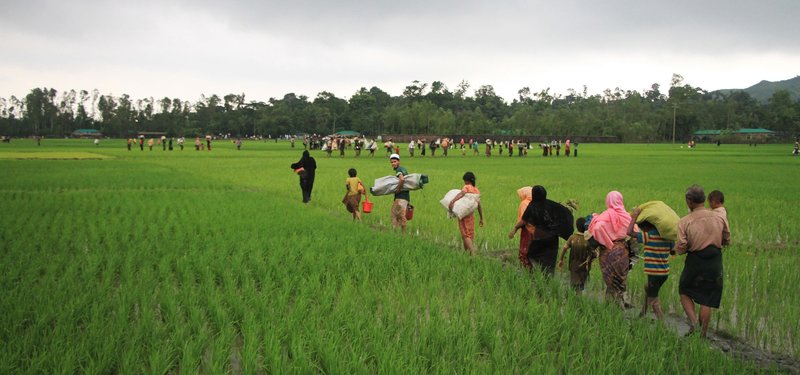
Rohingya returnees tortured by Myanmar police: HRW
New York-based Human Rights Watch said on Tuesday that "the reality is that Rohingya who go back still face the persecution and abuses they were forced to flee" despite the promised by the Myanmar government. "The torture of Rohingya returnees puts the lie to Myanmar government promises that refugees who return will be safe and protected," said HRW's deputy Asia director Phil Robertson.
- World
- Anadolu Agency
- Published Date: 12:00 | 22 August 2018
- Modified Date: 01:25 | 22 August 2018
A leading human rights group said on Tuesday that international monitoring was vital in the repatriation of thousands of Rohingya Muslims as Myanmar authority has tortured and imprisoned returnees from Bangladesh.
Since Aug. 25, 2017, more than 750,000 refugees, mostly children and women, have fled Myanmar and crossed into Bangladesh after Myanmar forces launched a crackdown on the minority Muslim community, according to Amnesty International.
More than 24,000 Rohingya Muslims have been killed by Myanmar's state forces since August 2017, said a new report by Ontario International Development Agency.
Myanmar has promised a safe return to the Rohingya refugees but the latter have expressed doubt about their safety.
New York-based Human Rights Watch said on Tuesday that "the reality is that Rohingya who go back still face the persecution and abuses they were forced to flee" despite the promised by the Myanmar government.
"The torture of Rohingya returnees puts the lie to Myanmar government promises that refugees who return will be safe and protected," said HRW's deputy Asia director Phil Robertson.
HRW said in a statement that three Rohingya men and three boys said Myanmar's border guard police "repeatedly interrogated them at gunpoint [...]".
The officers used stress positions; beatings with fists, sticks, and rods and burning and electric shock to force them to confess to an affiliation with Arakan Rohingya Salvation Army (ARSA), it said.
HRW said they were among 58 Rohingya returnees who, according to statement of the State Counselor Aung San Suu Kyi's Office, Myanmar President Win Myint pardoned.
"The treatment of these Rohingya refugees should be a warning sign to those who believe the Myanmar authorities are ready to ensure safe returns," Robertson said.
"Myanmar has a long way to go before it can demonstrate it is serious about making the necessary reforms for voluntary, safe, and dignified returns."
The Rohingya, described by the UN as the world's most persecuted people, have faced heightened fears of attack since dozens were killed in communal violence in 2012.
The UN documented mass gang rapes, killings -- including of infants and young children -- brutal beatings, and disappearances committed by security personnel.
In a report, UN investigators said such violations may have constituted crimes against humanity.

